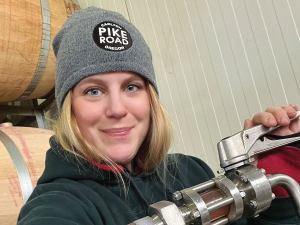The winemaker, who hails from Daytona Beach in Florida, has taken on as many vintages as she can while studying winemaking and viticulture through Nelson Marlborough Institute of Technology (NMIT). Two of them were in Oregon, and her final research paper considers the implications of myriad climate change events there. “I wanted to look and see if these events translated to the bottle,” she says from Central Otago, which she now considers home.
In the paper – Sensory Impacts of Climate Change Events on Pinot Noir grown between 2011-2020 in the ‘La Bohème’ Vineyard at Elk Cove in the Yamhill-Carlton AVA, Willamette Valley, Oregon USA – Steph delves into seasonal climate change impacts, using sensory analysis and taste as the markers.
The main objective of the study was to explore the possibility that climactic events and gradual warming trends could be ‘tasted’ and differentiated by tasters and, if so, to determine the markers on the palate that made the wines stand out. The secondary objective was to determine if there was any correlation between the qualitative sensory data and hard data like season-specific growing degree days or finished alcohol percentage.
With support from Elk Cove, her lecturer at NMIT Dr Stewart Field, and a panel of 20 industry tasting experts, Steph obtained a 10-year single vineyard vertical of Pinot Noir where the vineyard had experienced a range of significant climatic incidents that could be attributed to climate change. They included the earliest harvest on record, the latest harvest on record, a typhoon at harvest, and wildfires that caused smoke taint to wines.
Overwhelmingly, 80% of the tasters were able to identify the typhoon vintage (2013), 75% identified the wildfire/ smoke taint vintage (2020), and 62.5% identified the latest picked vintage (2011). Statistically significant differences were found for six out of 18 sensory descriptors. A positive correlation was found between fruit descriptor scores and higher alcohol vintages. This study concluded that individual climactic events can be particularly dire for the sensory characteristics of a finished wine and that they can be picked up in the finished product.
Stewart says the topic might suggest it is the extreme weather event years that are the future problem with climate change, rather than the general trend of warmer years. He and Steph agree that the topic deserves further scrutiny.
Steph initially studied hospitality and international business, which was a stepping stone to global travel. While completing an internship in Scotland, working in “high-end golf ”, a friend told her New Zealand was amazing. She had a one-year stopover in the Barossa Valley first, where her interest in wine started to ferment as she visited tasting rooms and learned as much as she could about various wines.
Then came two years in the Bay of Islands where she studied for her WSET. When Queenstown beckoned, she worked alongside Master Sommelier Cameron Douglas at the Lodge Bar. Steph was hooked and researched the best place to learn while working, before joining NMIT and kickstarting back-to-back vintages, with her seventh to be spent at Coal Pit vineyard in Central Otago this year. Her combined sommelier and winemaking skills are opening doors in many directions including the opportunity to judge twice at the New World Wine Awards.












